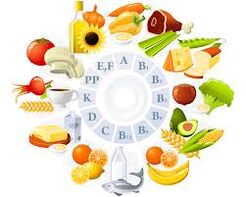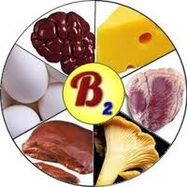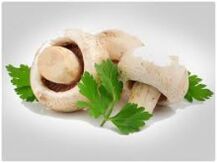
Everyone knows that vitamins are essential for our body, but few people realize that these substances are needed for the brain to function properly. Moreover, to preserve memory and thinking, certain groups of vitamins are required, which will be discussed below.
The most important B vitamins for memory
VitaminsB are the most important for the nervous system. We can say that the representatives of this group have the greatest influence on a person's memory and thinking. They support the functioning of nerve cells, and prevent early aging, protect the brain from overload and stress. Severe disorders in the nervous system result from low or complete lack of B vitamins, it reduces a person's memory and intelligence.
This group of vitamins includes the most important vitamins for the brain - B1, B2, B3, B5, B6, B9, B12.
Thiamine - Vitamin B1Thiamine is called the "vitamin of the mind" - vitamin B1, which has the greatest effect on mental abilities and memory. With the lack of it, thoughts begin to become confused and memory diminishes. Vitamin B1 directly protects the nervous system and is involved in supplying glucose to the brain.
With a full-fledged diet, one does not have this vitamin, since it is found in a large number of products: oats and buckwheat (many in a shell of grains and jars), bran, peas, nuts, carrots, radishes, beans, potatoes, spinach - they are suppliers of thiamine.

It is well absorbed, but also degrades rapidly, especially under the influence of alcohol, nicotine, sugar, tea tannins.
Vitamin B1 deficiency causes symptoms:- memory loss
- ; muscle weakness
- ;
- high physical and mental fatigue;
- impaired coordination and gait; numbness
- in the limbs; unreasonable irritability
- ; depressed mood
- ; tear and anxiety
- ; Sleep disorders
- .
In severe cases, polyneuritis, paralysis and paresis of the extremities may develop. The function of the cardiovascular system is also impaired, changes in the gastrointestinal tract can be observed (upset stools, constipation, nausea).
Riboflavin - Vitamin B2
Vitamin B2 - riboflavin is an "energy vitamin", an accelerator of energy and metabolism in our body, which accelerates mental processes in the brain, participates in the synthesis of nerve cells and the work of neurotransmitters (biologically active substancesnerve impulses are transmitted in nerve cells). With its deficiency, playing sports will lead to fatigue rather than energy and activity. Vitamin B2 tolerates high temperatures well, but degrades rapidly in light.
Meat and dairy products provide Riboflavin. These are liver, kidney, eggs, dairy products, yeast, tomatoes, cabbage, rose hips.
Vitamin B2 deficiency leads to:
- headache
- ;
- reduction of mental processes speed; sleepiness
- ;
- loss of appetite; weight loss
- ; weakness
- .
In addition, skin changes are seen - ulcers and cracks in the corners of the mouth (cheilitis), dermatitis of the skin of the chest and face; visual disturbances - photophobia, lacrimation due to inflammation in the cornea and mucous membranes of the eyes; the synthesis of adrenal hormones is disrupted.
Nicotinic acid - vitamin B3 or PP Nicotinic acid (nicotinamide, niacin) - vitamin B3 - can be called a "calm vitamin". Vitamin is involved in enzyme synthesis and helps to extract energy from food, and in the absence of it, the body experiences fatigue, depression, depression, insomnia. In addition, nicotinamide is directly involved in hormone biosynthesis (estrogens, progesterone, cortisol, testosterone, insulin and others).Large amounts of vitamin B3 are found in animal products: liver, eggs, kidneys, lean meats; to a lesser extent vegetable products - asparagus, parsley, carrots, garlic, green peas, pepper.
If it is absent in food, pellagra develops. The main symptoms of this condition are diarrhea (diarrhea), dermatitis (inflammation of exposed skin surfaces), and dementia (acquired dementia).
Pantothenic Acid - Vitamin B5
Vitamin B5 - Pantothenic Acid - This vitamin is found in many foods. This vitamin is involved in fat metabolism, in the transmission of nerve impulses, and also stimulates skin regeneration mechanisms. He believed that one cannot be deficient in this vitamin.
However, since more than half of pantothenic acid is destroyed during storage and cooking, the following symptoms may appear:
- Numbness limb
- ; memory impairment
- ; sleep disturbance
- ; headache
- ;
- paresthesias (tingling) of hands and feet;
- muscle pain.
Pyridoxine - Vitamin B6
Vitamin B6 - pyridoxine - is involved in the synthesis of neurotransmitters, including serotonin. Therefore, its other name is "vitamin antidepressant".Scarcity is the following properties:
- sleepiness
- ; irritability
- ; Prohibition of thinking
- ; depression
- ;
- feeling anxious.
Vitamin B6 is found in large amounts in yeast, cereals, legumes, bananas, meat, fish, potatoes, cabbage, peppers, cherries and strawberries.
In addition, vitamin B6 affects metabolism, state of the cardiovascular system, immunity, skin condition, hormone synthesis, hydrochloric acid in the stomach and absorption of vitamin B12. Folic acid - vitamin B9 Folic acid - vitamin B9 - is involved in the synthesis of neurotransmitters, including dopamine and serotonin, that is, it affects the processes of excitation and inhibition in the central nervous system. Also, vitamin B9 is involved in protein metabolism, transfer of genetic information during fetal development, it is necessary for the formation of normal blood cells. And in combination with vitamin B5, it slows down hair loss.If it is missing, the properties occur:
- memory impairment
- ; fatigue
- ;
- feeling anxious; anemia
- ; insomnia and apathy
- .
In nature, it is only synthesized by microorganisms, bacteria, blue-green algae and accumulates primarily in the liver and kidneys of animals. It is not synthesized by plants or animals. This "red vitamin" is found in animal products: fish, liver, kidneys, heart, oysters, which are also found in seaweed, soy. Vitamin B12 helps our body transition from waking to “sleep” mode to normalize mental processes, translating short-term memory into long-term memory.
Cyanocobalamin deficiency results in:
- chronic fatigue
- ;
- confusion of consciousness; hallucinations
- ;
- ringing in the ears; irritability
- ; dizziness
- ; sleepiness
- ; memory loss
- ; visual impairment
- ; dementia
- ; depression
- .
Apart from the B vitamins, there are other vitamins for memory and thinking.
Ascorbic acid - vitamin C
Ascorbic acid is a very powerful antioxidant and protects body cells from oxidative processes. Essential for maintaining the functioning of neurotransmitters in the brain.
Vitamin C is not synthesized in the body, it comes with food: rose hips, blackcurrants, sea buckthorn, parsley, sweet red peppers, citrus fruits, green onions, cabbage, shrimp, nettle, from animal productsit is found only in the liver. Tozopherol acetate - vitamin EAbove all, this fat-soluble vitamin is an excellent antioxidant that removes toxins and free radicals from the brain tissue. It is included in the lipid composition of cell membranes. A diet rich in foods containing vitamin E helps protect the body from heart attacks and atherosclerosis, thereby preventing the development of dementia.
For this purpose, the diet must include unspecified oils (olive, soy, corn), as well as green peas, wheat and rye sprouts, beans, green lettuce, lentils and oats.
Calciferol - Vitamin DIt enters the body with food and is synthesized in the skin under the influence of ultraviolet rays. Calciferol is the “main conductor” of calcium metabolism in the body. In addition to its important influence on bone and tooth formation, cell growth and development, vitamin D is needed for the proper transmission of nerve impulses and muscle contraction.
It is present in large quantities in animal products: butter, fatty fish (herring, tuna, salmon, mackerel), fish oil, liver, egg yolk.
Bioflavonoids - Vitamin P
The main effect of vitamin P is to reduce capillary permeability and vulnerability. Combined with ascorbic acid, it protects the body from oxidative processes. This prevents bleeding in the brain. Rich in vitamin C citrus fruits, rose hips, chokeberries, green tea, apples.
In addition to a balanced diet, the use of vitamins, we must not forget about other ways to prevent dementia. This is the only way to achieve good memory, energy and hope in old age.







































































